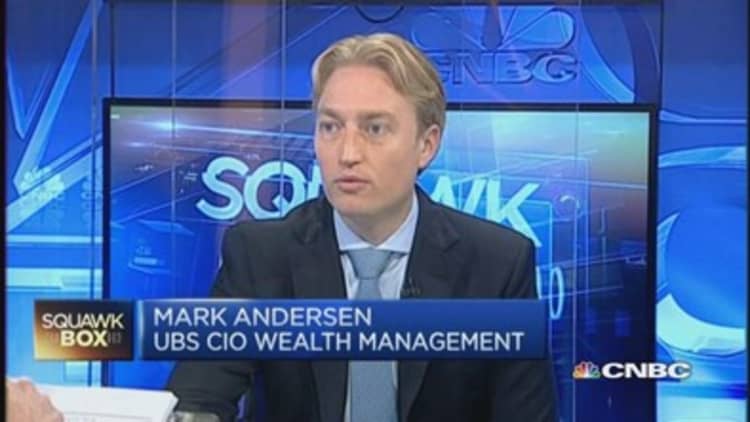Asian stocks finished in negative territory on Monday even as China's central bank lowered the reserve requirement ratio (RRR) for all banks by 100 basis points over the weekend.
The wider-than-expected cut on Sunday was the People's Bank of China's (PBoC) second reduction in two months as the world's second-largest economy combat slowing growth. The move to spur bank lending was also a "calming act" following a sharp selloff in stock futures and global equities on Friday when authorities announced a crackdown on over-the-counter margin trading and that it would allow fund mangers to lend shares to short sellers.
"The RRR cut attempted to put a calm on markets after Friday's news, but the magnitude of the cut was more than what the market priced in," Catherine Yeung, investment director at Fidelity Worldwide Investment, told CNBC Asia's "Squawk Box."
Read MoreChina cracks down on the 'sport for millionaires'
Some analysts say declines offshore sapped risk appetite in Asia on Monday. "What happened in the U.S. and Europe on Friday awakened people that this could be the start of a correction," Sani Hamid, director of Wealth Management, Economy & Market Strategy at Financial Alliance, told CNBC's "Capital Connection."
"Markets have been running strongly for the past weeks and people have been waiting for this 5-10 percent correction, which is long overdue," he added.
Major U.S. indices finished sharply lower at the end of last week as investors shunned risk amid new trading regulations in China, renewed worries about Greece's cash crunch, while looking ahead to a heavy week of earnings.
The major indices had their worst week since the one ended March 27, closing down about one percent for the week. On Friday, the and closed down 1.5 percent, respectively, while the S&P 500 index finished 1.1 percent lower.
Mainland markets down
After wavering between gains and losses from the get-go, China's Shanghai Composite index eventually closed down 1.6 percent. The Shanghai bourse hit a fresh 7-year-high of 4,356 points earlier in the day.
Banking counters turned lower; Agricultural Bank of China receded 2 percent, while the mainland's largest lender Industrial and Commercial Bank of China and China Construction Bank lost more than 3.7 and 4.7 percent each. Brokerage houses also took a hit; China Merchants Securities and Founder Securities plunged 6.7 and 5.5 percent.
Media stocks were among the outperformers; United Network, Shanghai Oriental Pearl Group and BesTV New Media charged up by the daily limit of 10 percent.
In Hong Kong, the Hang Seng index plummeted 2 percent, widening losses throughout the day to post the bourse's biggest loss in four months.

Nikkei flat
Japan's Nikkei 225 index slipped into negative terrain amid choppy trade as Friday's turmoil in global equities offset the impact from China's latest easing act.
Carmakers threw away gains in the afternoon session; Honda lost 1.2 percent, while Toyota Motor and Suzuki Motor nursed losses of 0.4 percent, respectively. Nissan was the outperformer, closing up 1.1 percent.
Panasonic jumped 2 percent after the Nikkei business daily reported that its net profit likely soared 70 percent to about 200 billion yen.
ANA Holdings was unchanged following a Reuters report over the weekend that it will lend a helping hand to bankrupt domestic budget carrier Skymark Airlines by buying a stake of less than 20 percent. The latter was delisted from the Tokyo Stock Exchange on March 1.
Read MoreWeek ahead for Asia:Watch out for these
ASX falls 0.8%
Amid a broad-based slump, Australia's S&P ASX 200 index ended Monday at a three-week low.
Oil and banking stocks were the day's laggards, with National Australia Bank leading losses, down over 1 percent. Big miners were mixed despite China's move to spur lending over the weekend; Fortescue Metals gained 1 percent, but Rio Tinto and BHP Billiton slipped 0.8 and 0.5 percent each, mired with concerns over the slump in iron ore prices.
Evolution Mining closed down 1.6 percent following news that the gold producer will combine with La Mancha Resources.
Read MoreThese iron ore players may get shafted: Goldman
Kospi adds 0.2%
South Korea's benchmark Kospi index closed a tick higher to chalk up a seven-session winning streak, after creeping back into positive territory by midday.
Blue chips turned mixed, helping the bourse to cut losses; Samsung Electronics fell 1.4 percent, but Hyundai Motor and KB Financial Group rebounded 2.7 and 0.5 percent each.
Hana Financial Group closed up nearly 2 percent, hovering near a two-month intra-day high, after announcing last Friday that its first-quarter profit jumped 94 percent on-year. Shares of SK Holdings retreated 1.1 percent on the back of news that the group's IT services company will merge with its parent in a stock swap.
On the domestic data front, producer prices for March fell 3.7 percent compared with the year before, central bank data showed on Monday, marking the fastest pace of decline since July 2009 and chalking up a fall for eight straight months as cheap global oil kept prices low.

